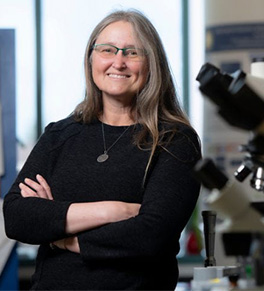A literal gut check

Be careful rummaging for Popsicles or other frozen treats in Katrine Whiteson’s home refrigerator. You might end up with an icy block of saliva, shark innards, urine — or worse.
Such hazards come with the territory of microbiome research, which involves exploring the networks of bacteria, fungi and viruses that live in, on and around us.
“Everyone I know in this field has samples like that in their freezer,” says Whiteson, a Chancellor’s Fellow and associate professor of molecular biology and biochemistry at UC Irvine. “My family hates it.”
But the unsavory items could help scientists foil various diseases.
Whiteson’s studies of how human gut microbiomes affect health have turned her into an apostle for chia seeds, avocados and other high-fiber foods. And her research has garnered an unusual array of financial backers, from the US Dry Bean Council to the Cystic Fibrosis Foundation.
Disease-fighting fiber
In her third-floor campus lab equipped with anaerobic chambers, an Instant Pot that serves as an autoclave and a poster explaining the chemistry of bad breath, stinky feet and flatulence, Whiteson discusses some of her current projects.
The newest one examines whether dietary fiber can help fight breast cancer. The inquiry was inspired by a Texas experiment in which melanoma patients who ate roughage-rich foods in advance of receiving immunotherapy outlived those who didn’t.
“When people are diagnosed with cancer, there’s often a window of several weeks before they start treatment or have surgery,” Whiteson says. “The goal is to get their diet and microbiome in good shape during that time and improve their chance of success.”
Encouraging gut health
Fiber also plays a starring role in some of Whiteson’s undergrad classes. Noting that roughage can lower cholesterol and the risk of type 2 diabetes, among other benefits, she asks students to add chia seeds to their meals and track how it changes their digestive tract microbiome, comparing before-and-after fecal samples.
When they see the results, many students stick with the regimen, says Whiteson, whose office is stacked with 25-pound boxes of the seeds.
She offers more in-depth nutritional advice through culinary health classes taught with executive chef Jessica VanRoo at the Susan Samueli Integrative Health Institute, part of UCI Health.
Whiteson’s lab also analyzes wastewater, sputum from cystic fibrosis patients and phages — viruses that kill bacteria and occasionally serve as a last-resort alternative to antibiotics.
Along with microbial ecologist Jennifer Martiny, PhD, a UCI professor of ecology and evolutionary biology, Whiteson directs the UCI Microbiome Center, which offers assistance to campus researchers investigating microorganism communities in soil, the ocean, people, even bumblebees. In 2019, the duo launched a national version of the concept called the Microbiome Centers Consortium.
Diagnosis sparks scientific interest
Raised in Northern California, Whiteson traces her scientific bent to being diagnosed with diabetes at age 6. “Having type 1 diabetes makes you a scientist whether you want to be one or not,” she explains. “At all times, half of my brain is tracking and managing my blood sugar.”
Another factor: Whiteson’s dad was a physicist.
As an undergrad at UC Berkeley, she studied voles, worked at a summer camp for diabetic kids in Chile and took a Danish class (her mom is from Copenhagen), where she met her future husband, Daniel Whiteson, now a UCI physics professor.
After Cal, she taught English at a Thai orphanage, earned a PhD at the University of Chicago and, in 2008, joined a Swiss lab where she “totally fell in love” with microbiomes, a relatively new field at the time.
Fermenting a fiber revolution
Whiteson, who is also an associate professor in the School of Medicine's Department of Pediatrics, came to UCI in 2014 and began spreading the gospel of fiber. She practices what she preaches. When her son and daughter were born, she says, “I made organic baby food from avocados.”
Later, she joined a club that ships heirloom beans, which are heavily featured in her household meals. “My family sees me as a little crazy with all the beans,” she admits. “And my daughter, now 14, isn’t wild about” the frequent servings of chia pudding. But Whiteson’s 16-year-old son, who runs cross-country, “has come around” on the fiber front, she adds. “We’ve optimized his diet for the sport.”
Whiteson hopes others will follow suit.
On average, Americans get only half the 20 to 40 grams of roughage they need each day, she says. Berries, nuts and lentils are some of the solutions she recommends. Salads and vegetables, she notes, typically “aren’t that fiber-dense.”
Whiteson advises increasing fiber intake gradually to avoid excessive gas. “Your gut is like a muscle. You have to start slowly.”
The UCI Culinary Health Program offers a free monthly webinar series — Understanding the Microbiome — that explores a range of topics that can improve gut health such as fermentation and fiber for improved immune health. They include themed recipes created and cooked by VanRoo in the institute's teaching kitchen.
Related stories
Explore Further
Browse more blog posts by topic.




